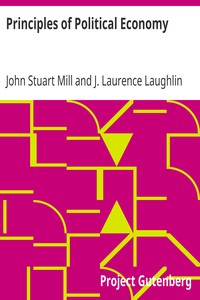| Author |
Mill, John Stuart, 1806-1873 |
| Editor |
Laughlin, J. Laurence (James Laurence), 1850-1933 |
| Title |
Principles of Political Economy
Abridged with Critical, Bibliographical, and Explanatory Notes, and a Sketch of the History of Political Economy
|
| Note |
Reading ease score: 52.7 (10th to 12th grade). Somewhat difficult to read.
|
| Summary |
"Principles of Political Economy" by John Stuart Mill is a scientific publication written in the mid-19th century. This work serves as a comprehensive textbook on the foundations of economic theory, exploring themes such as production, distribution, and the relationship between labor and capital. The focus of the book is on understanding the principles that govern economic activity and the factors that influence wealth creation within societies. The opening of this treatise outlines the preface and introductory remarks, setting the stage for the study of political economy. Mill’s approach emphasizes the historical evolution of economic thought and acknowledges previous economic theories while establishing his perspective. In the initial chapters, he introduces key concepts, such as the requisites of production—labor, natural resources, and capital—highlighting their interdependence and significance in fostering economic activity. Mill also begins to discuss the distinctions between different types of labor and the concept of capital, laying the groundwork for more in-depth analysis in the subsequent chapters. (This is an automatically generated summary.)
|
| Language |
English |
| LoC Class |
HB: Social sciences: Economic theory, Demography
|
| Subject |
Economics
|
| Category |
Text |
| EBook-No. |
30107 |
| Release Date |
Sep 27, 2009 |
| Most Recently Updated |
Oct 4, 2022 |
| Copyright Status |
Public domain in the USA. |
| Downloads |
1516 downloads in the last 30 days. |
|
Project Gutenberg eBooks are always free!
|

